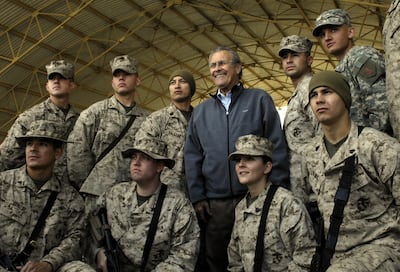Donald Rumsfeld, the US defence secretary who oversaw the invasion of Afghanistan and was the main architect of the Iraq war until former president George W Bush replaced him as the country found itself bogged down in a gruelling insurgency, has died at age 88, his family said in a statement on Wednesday.
The statement did not provide additional details but said Rumsfeld “was surrounded by family in his beloved Taos, New Mexico".
Regarded by former colleagues as equally smart and combative, patriotic and politically cunning, Rumsfeld had a storied career in government under four presidents and about a quarter of a century in corporate America.
But Rumsfeld was a divisive figure and he leaves a mixed legacy. His name is forever tied to some of the most controversial moments in modern US history including the 2003 invasion of Iraq, the establishment of the Guantanamo Bay military jail and a lack of focus on Afghanistan after the initial 2001 invasion, allowing the Taliban to make rapid gains.
Mr Bush praised his former Pentagon chief for his "intelligence, integrity, and inexhaustible energy", and added that he was a "very good man".
Rumsfeld was at the Pentagon during the terror attacks of September 11, 2001 that killed nearly 3,000 people. All 64 people on the plane that stuck the Defence Department were killed, along with 125 people in the building.
Rumsfeld oversaw the subsequent US-led invasion of Afghanistan, where the Taliban had been harbouring Al Qaeda.
Frequently presiding at televised briefings on the war, Rumsfeld became something of a TV star, applauded for his blunt talk and uncompromising style.
But after the quick defeat of the Taliban, the Bush administration’s attention shifted to Iraq in 2002, even though it played no role in the September 11 attacks.
The war effort in Afghanistan soon took a back seat, opening the way for a Taliban comeback and preventing the US from sealing the success of its initial invasion.
Twenty years to the day after the 2001 attacks, the US will formally end its involvement in Afghanistan, and the Taliban -- which have never publicly cut ties with Al Qaeda -- are widely expected to make rapid gains.
Assigned the task of reforming the US military for the new challenges of the 21st century, Rumsfeld ended up taking much of the flak for protracted campaigns abroad as the Pentagon budget swelled.
His insistence on using light invasion forces in both Afghanistan and Iraq and his lack of planning for the post-invasion periods were among the most salient criticisms of his tenure.

“Stuff happens,” Rumsfeld said in response to a reporter's question about looting in Baghdad after the US had ousted Saddam Hussein in 2003. “There is untidiness.”
Rumsfeld became a figure of controversy as the wars ground on against a backdrop of rising insurgency.
There were scandals over the alleged torture of prisoners at Abu Ghraib in Iraq and Guantanamo Bay, Cuba, while the US failed to find any Iraqi weapons of mass destruction, the pretext for the invasion.
Rumsfeld's brusque attitude and enigmatic utterances such as “known unknowns” and “unknown unknowns” made him a lightning rod for the wars’ sceptics.
“You go to war with the army you have, not the army you might want or wish to have at a later time,” Rumsfeld said in 2004 in response to a soldier’s question about inadequate Humvee armour, according to a New York Times article in 2004. The comment drew condemnation, partly because it was the administration that had chosen the invasion date — March 20, 2003.
Rumsfeld personally authorised "enhanced interrogation" techniques for detainees. The US treatment of detainees in Iraq and foreign terrorism suspects at Guantanamo drew international condemnation, with human rights activists and others saying prisoners were tortured.
Rumsfeld twice offered his resignation to Mr Bush in 2004 amid disclosures that US troops had abused detainees in Iraq — an episode he later referred to as his darkest hour as defence secretary.
By 2006, Rumsfeld’s popularity within the US armed forces had declined to the point where six retired generals, including some who had served in Iraq, called on him to resign. Mr Bush accepted Rumsfeld’s resignation on November 7, a day after Democrats captured both houses of Congress in the midterm elections.
After retiring in 2008, he headed the Rumsfeld Foundation to promote public service and to work with charities that provide services and support for military families and wounded veterans.
“Rummy”, as he was often called, is the only person to serve twice as Pentagon chief. The first time, in 1975-77, he was the youngest ever. The next time, in 2001-06, he was the second oldest.
He made a brief run for the 1988 Republican presidential nomination, a spectacular flop that he once described as humbling for a man used to success at the highest levels of the government, including stints as White House chief of staff, US ambassador and member of Congress.
Donald Henry Rumsfeld was born on July 9, 1932, in Chicago, according to his 2011 memoir, Known and Unknown. He was the son of George Rumsfeld, an estate agent in Winnetka, Illinois, and the former Jeannette Husted, a homemaker.
Rumsfeld is survived by his wife, Joyce, three children and seven grandchildren.

















